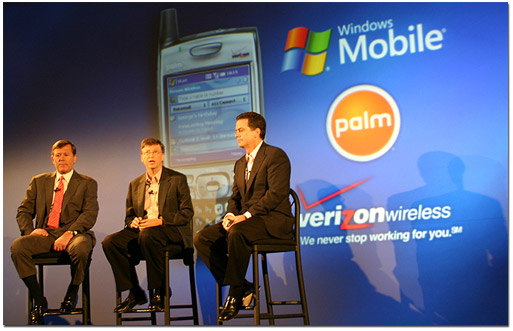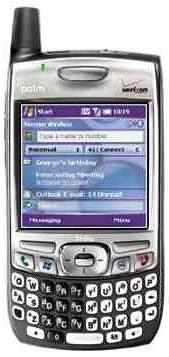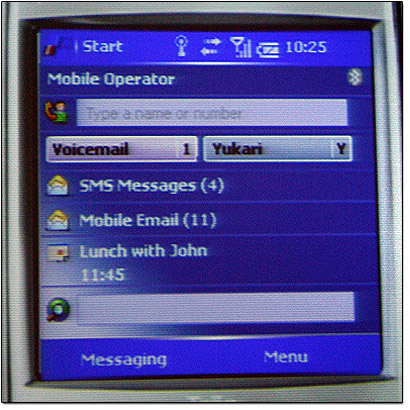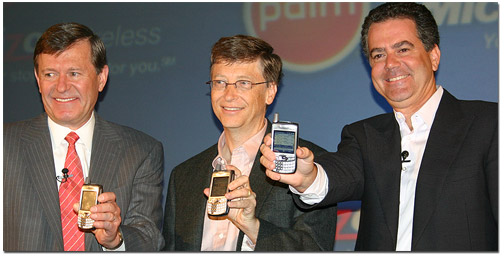Complete CTIA Coverage The Gates-Colligan-Strigl Conference | CTIA Conferences Notes | Interview with Greg Shirai | Windows Treo Photo Set | Palm Analyst Day notes
 Palm and Microsoft on Monday announced that Palm has licensed the Windows Mobile operating system for an expanded line of Treo smartphones, the first of which (unofficially known as the Treo 700w) will be available on Verizon Wireless' national wireless broadband network.
Palm and Microsoft on Monday announced that Palm has licensed the Windows Mobile operating system for an expanded line of Treo smartphones, the first of which (unofficially known as the Treo 700w) will be available on Verizon Wireless' national wireless broadband network.
Sharing the stage during the annoucement was Ed Colligan, president and chief executive officer of Palm, Bill Gates, chairman and chief software architect of Microsoft Corp and Denny Strigl, president and chief executive officer of Verizon Wireless.
"We've long believed that the future of personal computing is mobile computing, and our collaboration with Microsoft is a historic step in delivering that vision to a larger market," said Colligan. "We're confident customers will see a differentiated smartphone that delivers our world-class usability on Microsoft's flexible and robust Windows Mobile operating system. We collaborated with Verizon Wireless first because of its high-speed wireless network and growing footprint of BroadbandAccess cities."
"This is a landmark alliance that will help businesses remain on the cutting edge of competitiveness," Gates said. "Demand for accessing information on mobile devices is soaring, and businesses want a low-cost, scalable solution. We're excited to team with Palm and Verizon Wireless to deliver a winning Windows Mobile solution that connects professionals to their critical information while on the go."
As Ed Colligan said in the introduction, this is "A history day for the industry. Microsoft, Palm, and Verizon have the marketing firepower between them to make a difference. It's about expanding the family of Treos and extending the Treo's availability."
 A Windows Mobile Powered Treo
A Windows Mobile Powered Treo
The new Treo smartphone takes advantage of the Windows Mobile 5.0 platform in multiple ways, offering Outlook Mobile, Office Mobile and Internet Explorer Mobile built into the smartphone, as well as direct access to Exchange Server 2003 for mobile access to information.
The new smartphone is the first 3G enabled Treo and can access Verizon's EV-DO network (BroadbandAccess) with download speeds averaging 400-700 kilobits per second. Today, about half the U.S. population, in more than 84 metropolitan areas and in hundreds of airports across the nation have access to BroadbandAccess. Verizon Wireless has been expanding its BroadbandAccess service area steadily since its debut in the fall of 2003.
"The new Treo smartphone running Windows Mobile will highlight the speed and power of our BroadbandAccess service," said Strigl. "The Treo will deliver fast downloading of email and attachments as well as quick access to critical-business information, providing businesses with a great return on investment. Our strong relationships with Microsoft and Palm continue to provide real value for our customers."
Very little specific information about the new Windows Mobile powered product was unveiled. Instead the conference focused on the collaboration between the companies, and the new growth opportunity for Palm.
We did learn that the Windows powered Treo will ship "early early" next year, and be a Verizon exclusive for at least the bulk of 2006. Other carriers and networks (UTMS/GSM) will be supported in late 2006. There are currently working Windows Treos within Palm that seem to be stable, as Ed Colligan said he has been using it as his primary device for the last month.
The size of the device is identical to the Treo 650, except for a slighty curvier bottom. Colligan confirmed that the initial Windows Mobile phone will not have WiFi built-in, but that it can added through the SDIO expansion slot. More extensive product photos and screenshots are available by following this link.
 The Palm Experience on Windows Mobile
The Palm Experience on Windows Mobile
Palm is adamant in their belief that they will be able to customize the software aspect of the Windows Mobile Treo enough to differentiate it from the rest of the market. They have worked for several years with Microsoft, and had significant input into the development of Windows Mobile 5.
At the press conference, there were two very brief demos of some of the improvements Palm has made. The improvements included an MMS application, dialing by name ala the Treo, favorites dialing using photos, and a new voicemail user interface. (Read our interview with Greg Shirai, Director of Product Marketing for Palm about this topic.)
- Contact someone quickly from the Today Screen and choose between home, office or mobile numbers, or select email or SMS. With only two letters entered, a customer can find a record from among thousands of contacts;
- Reach people most often called via photo speed dials visible as a band of images on the Today Screen;
- Decline a call with a friendly SMS, signaling "In a meeting" or "Talking with the boss" instead of simply ignoring the call; and
- Rewind, delete or fast-forward through work or cell phone voicemail with familiar and consistent on-screen icons.
The new features in Windows Mobile that were shown off today are only a few of the changes Palm has made, according to Allen Bush, Director of Business Marekting for Palm: "You haven't seen anything yet... There is a lot of functionality in Windows Mobile - that other people have not quite unlocked. It was key to our strategy, to look at what others are doing; we saw lots of potential."
 A commodity market?
A commodity market?
Some are worried that despite the customization, Palm are making themselves irrelevant in the long-term. Reader whatever7 wrote that "Why do people keep saying Palm is a hardware company? It's not a freaking hardware company. Hardware is commodity. Hardware is a dime a dozen in Taiwan. Hardware is HTC. Software is Microsoft. Now nobody needs the middleman Palm."
Colligan stressed that Palm is aware of this, and is committed to keep innovating to keep being relevant.
TreoCentral asked Colligan specifically about their reliance on the relationship with HTC. His reply was, "Yes, we will continue to work with HTC on a broad range of programs. They are a great partner to us, we really work well together. As I said earlier, in this business, a lot of times there is competition and partnership within the same company. It is a great partnership. We have other partners we work with that do ODM [Original Device Manufacture] manufacturing with us as well. You can expect us to certainly spread the various programs around to various partners so that we aren't dependent on any particular partnership, and I think that on this platform, on particular, it will be incumbent on us to continue to innovate atop of it."
During a short interview with Allen Bush and Douglas Smith, a Group Marketing Manager of the Mobile & Embedded Devices devision of Microsoft, we were able to inquire about the announcement and the future of Palm OS.
Palms advantage, according to Smith, is the strong focus that Palm has in the mobile market along with their strength, passion, and experience. Microsoft also has much carrier experience, so working together can only increase their strength. During the press conference, Bill Gates replied to a TreoCentral question relating to this isues, saying that "Palm is adding value both at the hardware level and the software level. You got a since of some of the key innovations. There will be a lot of windows mobile users who want to switch to this device - the big challenge will be to keep the product in stock. Palm is a great partner."
Back in the one on one interview, Bush and Smith again reiterated how this announcement is about the partnership, and less about the device. The relationship is strategic, and Palm will differentiate as long as they stay one step ahead of innovation, which Palm and Microsoft believe they have and will be able to do.
Future of PalmOS?
This announcement does not mean the end of Palm OS; Bush did go on record to say that "Yes, we will have future Treo products on Palm OS".
However, it will be interesting to see what the future demand for a Palm OS based Treo will be from the carriers; most seem to standardize on the Windows Mobile platform for their advanced smartphones. Palm OS is also showing showing its age, and the product roadmap is unknown now after the purchase by Access.
Forbes' David Ewalt wrote an intersting article that states "there's already considerable distance between Palm and its namesake OS ... Access' interest might not even have been the Palm OS. By acquiring PalmSource, the company gained Linux development resources for mobile devices in the U.S., France and China, including those from PalmSource's recent acquisition of China MobileSoft, a Linux software firm. It's possible the software firm could discontinue the OS, deciding instead to take the company's technology and engineers in new directions."
Extensive coverage of the announcement of the Windows Mobile Treo will follow througout the next few days.
